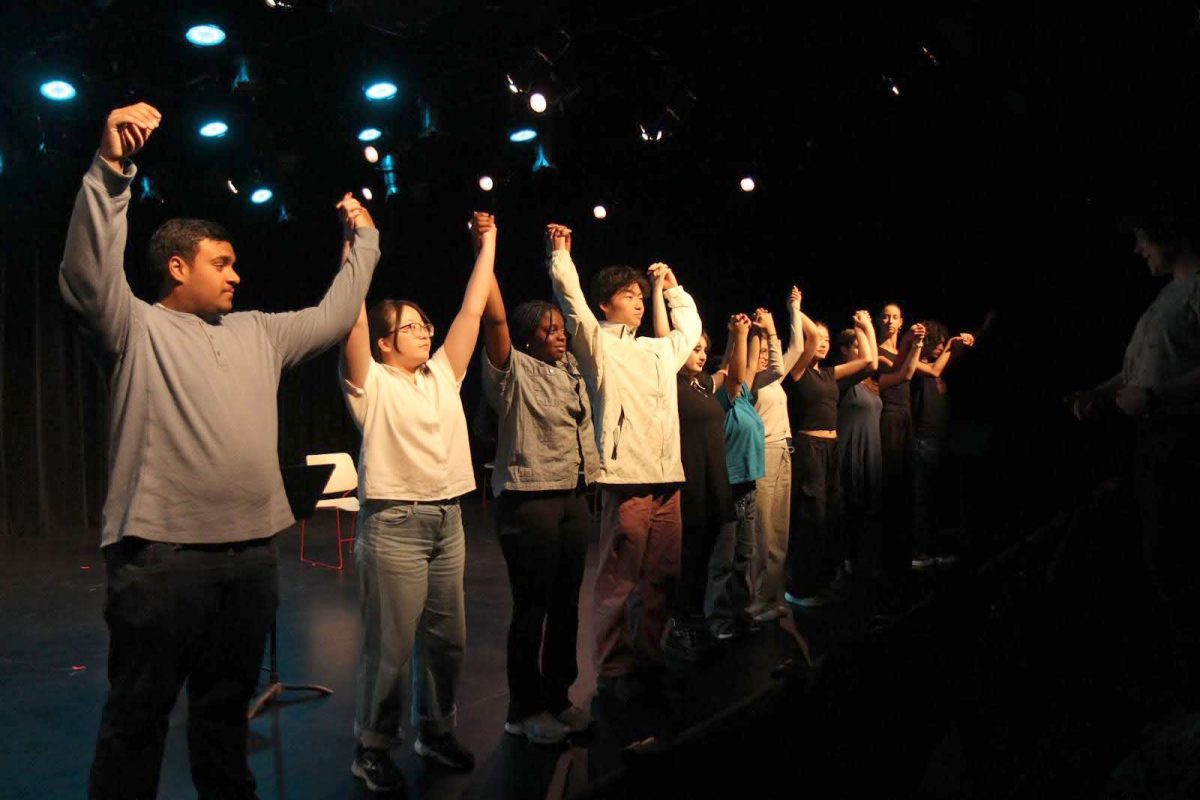Actor Stephen Straub ‘14 made a joke to describe certain audience members’ reactions to the Theater and Dance Department’s spring show, In the Blood: “How do you make a typical Macalester student uncomfortable? Tell them the truth.”
Two weeks after the play’s closing night, audience members and team members alike are still reeling from the impact of the show. Some are still squirming in discomfort.
While the play’s website alerted theatergoers of “sexual situations” that occurred in the play, some audience members felt that they had not been adequately warned for the triggering portrayals of violent sexual assault, in which the main character, a black woman, is raped. The play’s cast members, most of whom identify as students of color, felt “hurt” and “short-changed,” as they were excluded from early conversations about the absence of these trigger warnings, which ultimately led to a discussion Tuesday of this week about the issues the play presented.
“This department lacks communication among communities of color,” explained Straub. “Things get swept under the rug in place of larger issues — we’re going to talk about sexual violence but we’re not going to talk about people of color. When a black woman experiences rape, it’s different than when a white woman experiences rape.”
“If [the lack of trigger warnings] is all you got from this play, you’re missing something.” said Christine Ohenewah ’15, who played the lead role of Hester, La Negrita with the maturity and grace of a much more seasoned performer.
A cast of six Macalester students under the direction of Harry Waters Jr. created this production of Suzan-Lori Parks’ Pulitzer Prize-nominated play, with a crew of many students, staff and guest artists (including set and lighting designer Tom Barrett, sound designer Mike Croswell, costume designer Trevor Bowen and properties designer Maria McNamara). In the Blood tells the story of Hester, a homeless, black woman living in the “here and now” (the only specifications for setting that Parks gives in her script) struggling to provide for her five children, each of a different father. Hester is exploited by virtually every adult character in the play, acted by the same people who portray her children.
In an earlier post-show discussion on Monday with just the cast and crew in attendance, although the space had been opened to the entire theater department, many of Ohenewah’s fellow cast and crew members agreed that Macalester community members seldom discuss issues of sexual assault in the context of race. “It’s about damn time somebody said something about black women,” Ohenewah said. “We never make efforts to talk about female bodies of color.”
“It just doesn’t happen here,” actor Lester Jacobson ’14 concurred.
Following the matinee performance of the play on Saturday, April 12, a panel discussion featuring Robin Hart Ruthenbeck, Professor Brittany Lewis ’09, Brianna McCurry and Nicole Smith, moderated by dramaturge Raynise Cange ’14, made space for these kinds of conversations. Few Mac students attended the talk-back. But the sole fact that these were four black women speaking about their experiences and scholarly backgrounds made an impact on actor Salima Seale ’14. Moments in the process of the play like this panel have been a first for the senior.
“This was the first show that I could see myself in,” said Seale, who has been involved with a show every semester at Macalester since the spring of her first year. “I see some of my experience — some of what people don’t see of my experience — in these characters. I’m very sensitive to how people react, because I see my experience and this play as inextricably linked.” Seale drew from a set of people and images to develop each of her characters (for example, Mellie Grant from the TV show “Scandal”), in some cases using different people and images for different scenes with the same character. “I had particular people to go to to get in the zone,” she explained.
Ohenewah faced her own difficulties in taking on Hester. “I definitely approached the character from a perfectionist standpoint,” she said, laughing. “We had to chip away at that.” Ohenewah explained the challenge of dressing and speaking in a manner that deviated so dramatically from her usually perfected image, describing the vocal exercises through which director Harry Waters Jr. put her, and the process of removing her wig and wearing tattered clothes. To further develop her character, Ohenewah asked each of the cast members to meet with her one-on-one, which several actors attribute to their ability to do the play in the first place.
“The first step was you had to get over yourself,” Jacobson said, speaking about his point of entry to the issues of the play as a straight, white male. “In order to make it real, you had to find something of yourself in each of your characters, and some of these characters are scum.”
This team of students unified in the solidarity that comes from working together to create something bigger than any one person. “What I heard people saying was how unapologetic we were,” said actor Harrisonford Fauni ’16. “That adjective was exactly what we wanted to hear from the audience.” Safety in numbers was important in achieving this goal, as well as in facing the potentially traumatizing subject matter behind it. Actor Pia Mingkwan ’17 explained, “I would say that we didn’t protect ourselves [emotionally], but that was OK because of who we were with.”
Before one of the previews, Mingkwan had such intense nerves that she made an intimate request of her fellow actors.
“I asked everyone to lay down on the floor and cum with me,” she said — unapologetically. It prepared her for her moment of climax, alone onstage, and united her cast members in the simple fact that “everybody moans.” Dance parties during performance intermissions also served to break the tension and bring the actors together. Assistant stage manager Rafi Schneider ’17 explained, “We had regular cast parties during the show, so we were all close and friends rather than just people who worked together.”
“This play could not have happened with any other group of students at Macalester,” said Waters, in his only comment in the discussion on Monday. “They are all fearless artists, because they had to be honest.” They succeeded in creating something that will resound in the community for a long time. And in so doing, made more than a few people uncomfortable.







Rebecca Poole • Sep 11, 2019 at 9:39 am
Loving the info on this website , you have done great job on the articles.
Julia Murray • Sep 10, 2019 at 4:23 am
Itís my first pay a visit to this website, and I am actually amazed to see such a fastidious feature YouTube video posted here.
Robert Knox • Sep 6, 2019 at 9:03 pm
some genuinely nice and utilitarian info on this internet site, too I conceive the style and design holds great features.